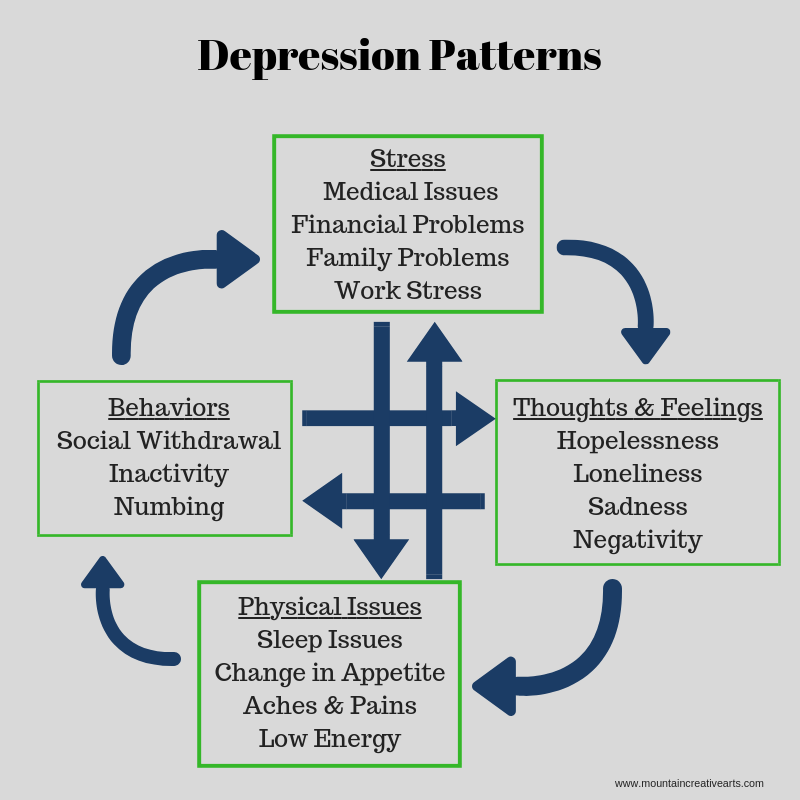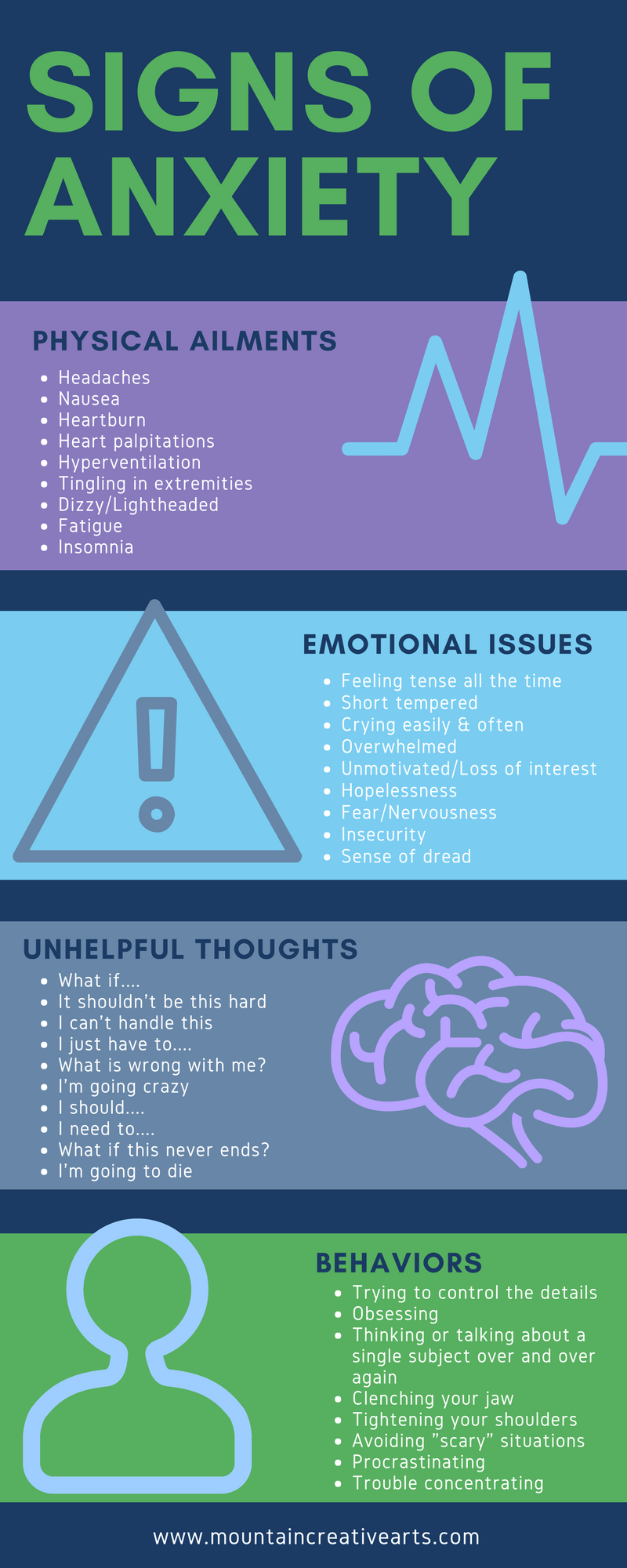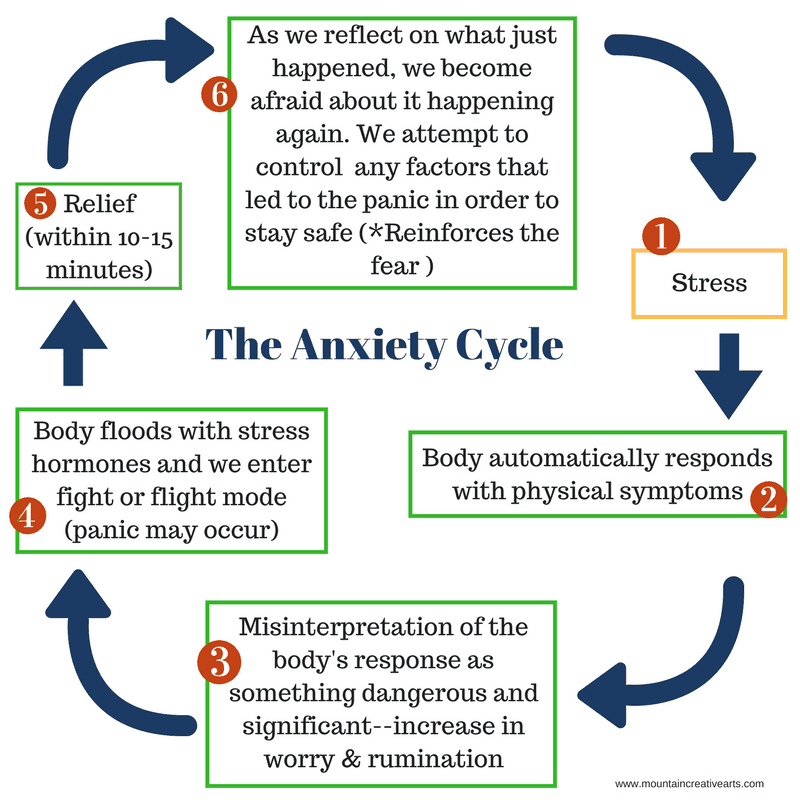Anxiety and Depression Don’t Have to Rule Your Life Anymore
There is Hope for Something Else
“The second journey begins when we cannot live the afternoon of life according to the morning program.” ~ Brennan Manning
Past stressful experiences can trick your brain into operating from “fight, flight, or freeze mode” at the slightest trigger. Changing the way your brain responds to stress involves changing your thinking patterns and how your body reacts to your thoughts and feelings. You’ll learn some basic information about anxiety to help make it less mysterious and scary; you’ll practice how to be in the moment rather than thinking about the future; and you’ll learn and practice different techniques to release the stress stored in your body and help you get through moments of panic. Most importantly, we’ll take a look at your current lifestyle and find realistic ways to make the changes needed to plug what you’re learning in session into your day-to-day routine.
Signs of Anxiety
You’re not broken or crazy if you’re experiencing these symptoms. Anxiety is a normal response to your body’s experience of stress. Sometimes this stress is real and right in front of you, and sometimes it’s imagined–either memories of something in the past or thoughts of something you fear may happen in the future. Your body may react the same regardless of the source, so one of our first tasks will be practicing ways to stay in the present moment.
The Anxiety Cycle
You may have tried everything to get rid of your anxiety. It’s important to remember that anxiety or fear will never completely go away. It’s a normal emotion that every human feels. When you experience stress, anxiety tricks you into using methods that maintain your symptoms. You’ll find that accepting and even embracing anxiety will bring more relief than resisting it or trying to remove it from your life.
Relationship between Anxiety and Depression
 Anxiety and depression are closely linked and may occur at the same time. Like anxiety, depression affects our thoughts, feelings, and behaviors. Both anxiety and depression respond to stress in a similar way: Stress triggers a flight or fight response to a threat, with anger and rage at one pole (fight) and depression and anxiety at the other pole (flight).
Anxiety and depression are closely linked and may occur at the same time. Like anxiety, depression affects our thoughts, feelings, and behaviors. Both anxiety and depression respond to stress in a similar way: Stress triggers a flight or fight response to a threat, with anger and rage at one pole (fight) and depression and anxiety at the other pole (flight).
Both anxiety and depression involve the experience of being overwhelmed. However, depression is a withdrawal response, and there are often other emotions underneath the depression. When anxious, our thoughts may be fear-laden (“what if?!”). When depressed, our thoughts may reflect discouragement, hopelessness or despair. People suffering from anxiety may begin to experience significant depression when their anxiety worsens. People struggling with serious depression may become anxious when their thoughts increasingly focus on fears about their future.

I want you to know that you’re not alone, and you don’t have to do this alone. Contact me to schedule your free, in-person, 30 minute consultation, and I’ll guide you through the process.
What is Trauma-Informed Counseling?
Trauma-Informed Counseling means recognizing that people often have many different types of trauma in their lives. In general, trauma is the experience of extreme stress that overwhelms a person’s ability to cope. People who have been traumatized need support and understanding from those around them. Often, trauma survivors can be re-traumatized by well-meaning caregivers and community service providers who haven’t been properly trained.
Trauma is usually shrouded in secrecy and denial; and it is often ignored. However, we now know that trauma is a near universal experience of individuals with behavioral health problems. According to the U.S. Department of Health and Human Services’ Office on Women’s Health, 85% to 95% of women in the public mental health system report a history of trauma. An individual’s experience of trauma impacts their physical, mental, behavioral, social, and spiritual lives.
Why does Trauma-Informed Counseling Matter?
Trauma-Informed Counseling is more that just a theory, it is an overall approach to counseling that includes everything from being mindful about the way the physical environment of the therapy room may affect clients, to understanding that even the most destructive behavior patterns are simply a way of adapting to the trauma and a method of surviving and managing current discomfort.
Trauma-informed counselors recognize the signs and symptoms of trauma, and believe that recovering from the trauma is just as important as dealing with the “issue” that brought the client to therapy in the first place (ie..substance use, depression, anxiety, eating disorders, etc.). Trauma-informed counselors focus on and build strengths: life will inevitably bring new challenges, and reliance on these strengths is key to navigating those challenges and making it through to the other side. Furthermore, trauma-informed counselors make their own self-care a priority so they don’t burn out or experience vicarious trauma. Finally, and most importantly, trauma-informed counselors wholeheartedly believe that people with lived experiences of trauma can and do recover and heal.
Telehealth
In addition to providing telehealth to residents of NC, I am an out-of-state telehealth provider for the state of Florida (Registration #TPMC2953): https://flhealthsource.gov/telehealth/. I am also a Professional Counselor Telehealth Provider in South Carolina (Credential #388): https://llr.sc.gov/TeleHealth/Counselor.html.
Distance counseling may be a good option if you are unable to attend sessions in person. A stable internet connection, email, and a credit/debit card are needed to participate. Before our first meeting, I will provide instructions for connecting to a secure, HIPAA-compliant telehealth system. I will also send you several forms via email for you to complete and return to me before this initial session. We will also establish procedures for online payment.
During our first session together, I will gather information about you, your history, your current difficulties and where you want to be in your life. We’ll work together to define your goals for therapy and your focus for each session.
Similar to in-person counseling, sessions are 60 minutes long and we’ll meet weekly to start. Weekly sessions will allow you to deepen trust in our relationship, feel more safety to do your work, maintain focus and consistency on the therapy process, and more quickly achieve your goals.
Ready to Get Some Relief? Let’s Connect
Schedule your free 30 minute initial consultation.
Please note that all therapy sessions are being conducted virtually until further notice.
Kara Ashley-Gilmore, LCMHC, ATR-BC, SEP
Phone: 828-785-4789
Email: kgilmore@mountaincreativearts.com


